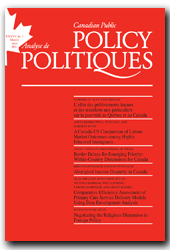We examine the effects of the Universal Child Care Benefit on the labour supply of mothers. The benefit has a significant negative effect on the labour supply of legally married mothers, reducing their likelihood of participation in the labour force by 1.4 percentage points and hours worked by nearly one hour per week. In contrast, the likelihood of participation by divorced mothers rises by 2.8 percentage points when receiving the benefit and does not affect hours worked. Moreover, the benefit does not have a statistically significant effect on the participation of common-law married mothers or never-married mothers.
Koebel, K., and T. Schirle. 2016. “The differential impact of universal child benefits on the labour supply of married and single mothers.” Canadian Public Policy, 42(1), 49–64. https://doi.org/10.3138/cpp.2015-049
Publication Type
- Article



